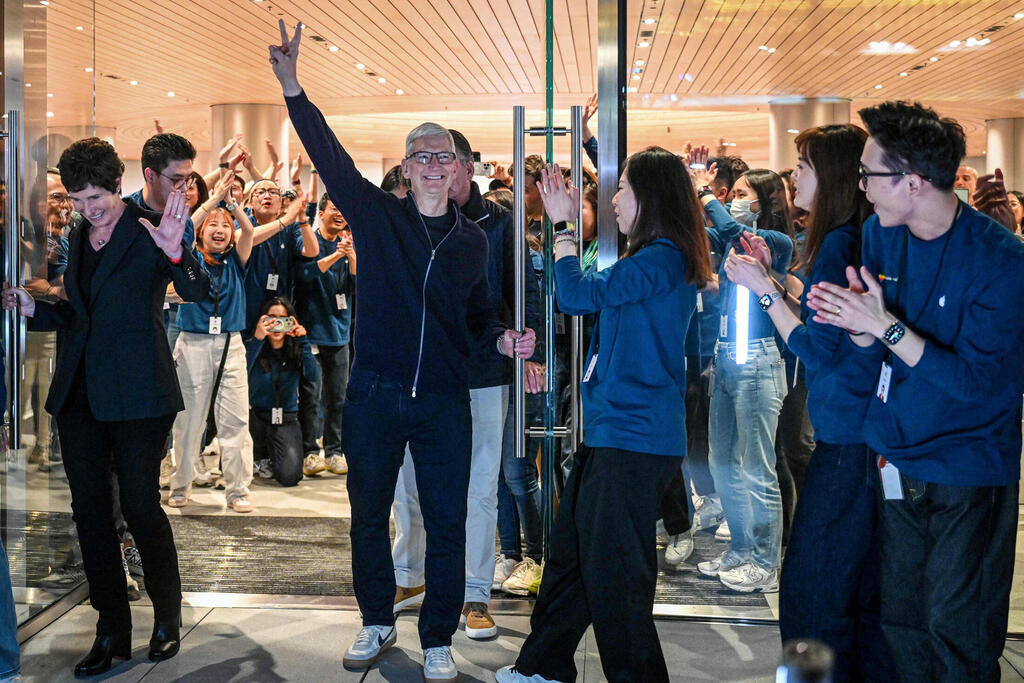
Analysis
Apple's AI shortcomings put Samsung's smartphones back in the lead
In the first quarter, iPhone sales fell by 9.6% and Samsung returned to dominate the market. Apple will look to show it has closed the gap in the AI race in its conference in June. The obstacle: a Chinese ban on government employees using iPhones
The crisis in China and the weakness in the field of generative artificial intelligence (GenAI) are hitting Apple where it hurts the most and have resulted in a dramatic drop of nearly 10% in iPhone sales, leading to the loss of market dominance to Samsung. However, the company has an opportunity to narrow the gaps with the deployment of its AI vision at the developer conference it will hold in June. If its offer is enticing enough, it could reverse the downward trend by the end of the year.
According to data from the research company IDC, in the first quarter of 2024, global smartphone sales stood at 289.4 million units, an increase of 7.8% compared to the corresponding quarter in 2023. Despite this, iPhone sales recorded a sharp drop of 9.6% to 50.1 million units. Samsung's smartphone sales did decrease by 0.7%, but with 60.1 million devices reaching the market, the company reclaimed the crown of the world's largest smartphone manufacturer.
The two largest Chinese manufacturers on the list - Xiaomi in third place and Transsion in fourth - recorded a jump in sales of 33.8% and 84.9% respectively. In the total calculation, Xiaomi's sales stood at 40.8 million units and Transsion's at 28.5 million. On the other hand, OPPO's sales in fifth place fell by 8.5% to 25.2 million smartphones.
"As expected, smartphone recovery continues to move forward with market optimism slowly building among the top brands," said Ryan Reith, group vice president with IDC's Worldwide Mobility and Consumer Device Trackers. "While Apple managed to capture the top spot at the end of 2023, Samsung successfully reasserted itself as the leading smartphone provider in the first quarter. While IDC expects these two companies to maintain their hold on the high end of the market, the resurgence of Huawei in China, as well as notable gains from Xiaomi, Transsion, OPPO/OnePlus, and vivo will likely have both OEMs looking for areas to expand and diversify. As the recovery progresses, we're likely to see the top companies gain share as the smaller brands struggle for positioning."
"The smartphone market is emerging from the turbulence of the last two years both stronger and changed," said Nabila Popal, research director with IDC's Worldwide Tracker team. "Firstly, we continue to see growth in value and average selling prices (ASPs) as consumers opt for more expensive devices knowing they will hold onto their devices longer. Secondly, there is a shift in power among the Top 5 companies, which will likely continue as market players adjust their strategies in a post-recovery world. Xiaomi is coming back strong from the large declines experienced over the past two years and Transsion is becoming a stable presence in the Top 5 with aggressive growth in international markets. In contrast, while the Top 2 players both saw negative growth in the first quarter, it seems Samsung is in a stronger position overall than they were in recent quarters."
Behind the sharp decline in Apple sales are two main factors. One is the change of attitude towards the company on the part of China against the background of the prolonged trade war with the United States. This war has its roots in the presidency of Donald Trump, but it accelerated significantly in October 2022 when President Joe Biden banned the export of high-performance chips to China. These restrictions, and additional restrictions imposed later, led to a series of counter-reactions from Beijing, more and less direct. In September 2023, government offices and agencies in China began banning their employees from using iPhones at work. The authorities did not explain the move, except for a reference to "reports in the media" about security failures in the iPhone, but according to estimates, this is part of the administration's response to American sanctions.
At the same time, Beijing is working to strengthen the local chip industry and promote sales of Chinese smartphone manufacturers. These two efforts came together last September when Huawei unveiled a fifth-generation smartphone based on a communications chip it developed, which managed to bypass sanctions by the Trump administration from 2019. As far as Apple is concerned, the result was a drop in sales in China as early as the last quarter of 2023 when iPhone sales fell by 2.2% (although, due to a sharper decline in Chinese manufacturers, the iPhone quickly became the best selling smartphone sold in China). However, in the first quarter of 2024, it seems that Apple's downward trend in China only intensified, while most Chinese manufacturers, under the support of Beijing, changed direction and moved to significant growth.
The second factor is related to Apple's perceived weakness in the field of generative artificial intelligence (GenAI). The surprising rise of GenAI models and services based on them, such as ChatGPT and Dall-E, caught Apple off guard and without significant research activity in the field. The company is making significant efforts to reduce gaps, and in the last year has been investing considerable sums and personnel resources in the field. However, it seems that its gaps in relation to the competitors are still wide. Therefore, according to reports, Apple is examining the possibility of cooperation with Google in which the company's GenAI model, Gemini, will be integrated into future versions of the iPhone operating system.
But in the meantime, the rivals are already taking advantage of the company's shortcomings in order to establish facts on the ground. Samsung, in particular, managed to catch the wave accurately when it launched the Galaxy S24 at the beginning of the year under the branding "the world's first AI smartphone", which in a structured way combines capabilities such as drafting messages and emails, summarizing articles, transcribing recordings, and more. The launch of the device did not prevent the decline in Samsung's smartphone sales, but it slowed it down significantly and allowed it to position itself as a leader in the field of AI among mobile manufacturers. This positioning damaged the image of Apple and the iPhone, and is probably also related to the decline in sales.
While it will be difficult for Apple to fix the situation in China on its own - the crisis, after all, is the result of geopolitical struggles between Washington and Beijing - when it comes to the gaps in the field of GenAI, Apple has the opportunity to present a decisive answer. This, as part of the company's annual developer conference, which will open on June 10. As part of the conference, Apple will present the updated versions of its operating systems, which are expected to include advanced AI and GenAI capabilities this year. As is tradition, Apple keeps its plans secretive, but based on what has been seen in the market over the past year, capabilities that the company may incorporate include the creation and translation of texts, transcription of recordings and videos, and image-based generative capabilities (for example, completing backgrounds of an existing image or making editorial changes to an image using text command). A complementary move will be made by Apple this fall, with the unveiling of the latest iPhone models, which are expected to incorporate stronger AI capabilities, partly thanks to the use of faster and more advanced processors.
The updated version of the operating system will be officially launched only in the fall, at the same time as the new iPhone models. The implication for Apple is that the downward trend may continue at least in the current quarter and the one after that. However, if Apple manages to present a sufficiently enticing and attractive solution in the field of GenAI, it could end 2024 back on top.















